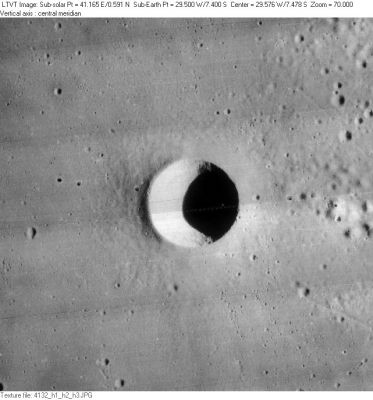Euclides
Contents
Euclides
|
Lat: 7.4°S, Long: 29.5°W, Diam: 11 km, Depth: 2.57 km, Rükl 41 |
Images
LPOD|Photo Gallery images Lunar Orbiter Images Apollo Images
Maps
(LAC zone 76A4) LAC map Geologic map LM map AIC map
Description
Description: Elger
(IAU Directions) EUCLIDES.--One of the most brilliant objects on the moon; a crater 7 miles in diameter, standing on a large bright area in the Mare Procellarum, W. of The Riphaean Mountains. Its W. rim rises nearly 2,000 feet above the bright depressed floor; on the E. there is a bright little unrecorded crater.
Description: Wikipedia
Additional Information
- Depth data from Kurt Fisher database
- Westfall, 2000: 2.57 km
- Viscardy, 1985: 1 km
- Cherrington, 1969: 1.34 km
- From the shadows in LO-IV-132H, Euclides is about 2600 m deep.
- Euclides and its satellite craters C and M are on ALPO list of bright ray craters
- Euclides and Euclides D ("Eppinger") are thermal anomaly craters, implying youthful ages - Moore et al, 1980
- Mutch, 1970 (p. 66, Figure IV-5) offers Euclides, along with Mösting C and Censorinus, as examples of a class of fresh craters with "circular plan views, simple cup-like profiles, sharply raised rims, and prominent surrounding ejecta, frequently with a hummocky inner facies and a radial outer facies." Mösting C is noted as having a somewhat flat floor when examined in detail. It is unclear if the sun angle in any of the Lunar Orbiter or Apollo photos of Euclides were high enough to reveal details about its central floor. The Clementine mosaics clearly indicate Euclides has a flat floor and probably a conical shape. - Jim Mosher
- TSI = 5, CPI = 5, FI = 5; MI =15 Smith and Sanchez, 1973
The yellow spot north of Euclides M
- The southern part of Montes Riphaeus seems to show a yellow spot, just north of the high-albedo bowl shaped crater Euclides M, see the LROC's WAC-albedo/color map; close up of the Euclides M region: http://bit.ly/1EdZ5m1
Nomenclature
Euclid; Greek mathematician (unkn-c. 300 B.C.).
- According to Whitaker (p. 219), this name was introduced by Mädler.
- Euclides D was once known as Eppinger.
- Was Euclides M called Zeno? (see Whitaker, page 164, Figure A; nomenclature of J.N.Krieger).
LPOD Articles
Bibliography
